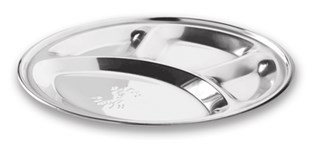^ The reusable stainless steel Glastonbury cup quickly became a collectable souvenir of the event. Photo courtesy of Outokumpu.
Article by Joanne McIntyre
Article by Joanne McIntyre
___
The ban on single-use plastic items will come into effect in 2021 under draft plans approved by Parliament. MEPs also added to this list of plastics banned from the EU market from 2021: products made of oxo-degradable plastics, such as bags or packaging and fast-food containers made of expanded polystyrene.
National reduction targets
The consumption of several other items, for which no alternative exists, will have to be reduced by member states by at least 25% by 2025. These items includes single-use burger boxes, sandwich boxes or food containers for fruits, vegetables, desserts or ice creams. Member states will draft national plans to encourage the use of products suitable for multiple use, as well as re-using and recycling. Other plastics, such as beverage bottles, will have to be collected separately and recycled at a rate of 90% by 2025.
The ban on single-use plastic times offers opportunities for fabricators who are keen to identify opportunities where stainless steel – the ultimate recyclable material – can make in-roads.
Demand for stainless KEGs increasing
Once such company is SCHÄFER Container Systems, which predicts that worldwide demand for stainless steel KEGs will continue to rise in the short and medium term. That’s the view of Business Unit Sales Director Guido Klinkhammer, and he is not only referring to the order books in his own company. The expert sees the both ban on one-way plastic products and the general trend towards sustainability as the main drivers.
Additionally, the increasing variety of beers for which stainless steel KEGs, both large and small are much better suited, is driving demand. “Though PET KEGs do have their benefits, their use will be considerably reduced over the coming years”, says Klinkhammer. Reusable KEGs offer breweries greater options regarding volumes and branding potential and those made of stainless steel don‘t influence the flavour of the beer they contain. This is a complete contrast to plastic, from which substances can generally leach into the environment and have quite harmful effects.
Stainless steel KEGs are much more ecological and economical than plastic equivalents. They can be used for up to 30 years and their average of 4 cycles per year significantly cuts down CO² emissions, compared with those generated by the production of new one-way containers. At the same time, they are 100% recyclable. This means that, taking the scrap value and multiple usage into account, the cost proportion of a 30 litre stainless steel KEG for each dispensed beer, for instance, is around one twentieth of that of a plastic KEG, despite the initially greater outlay.
Klinkhammer: “Fortunately, the trend towards sustainability is becoming increasingly prevalent in the beverages industry. This is a very desirable and ethically very sensible change of attitude to our overall situation, because singleuse products are an enormous burden on the environment. This also applies to one-way Kegs.
Ultimately, it is also the higher quality and reliability of stainless steel KEGs that contributes to demand for them. For example, containers up to 50 litres have to withstand at least 60 bar pressure without bursting to conform to DIN 6647-1. That’s why, right from the outset, many KEGs are fitted with a safety bursting point that opens at 50 bar and releases excess pressure without any risk. There is no such regulation for oneway containers made of plastic.”
Expanding uses
Stainless steel products are expected to replace many of the common plastic items used in households, ranging from water bottles to lunchboxes and to dinner plates and dog bowls. A good example was the development of stainless steel mugs for the Glastonbury Music Festival in the UK. Michael Eavis, the founder and organizer of the festival which is held each year in Somerset, has no trouble booking world-famous acts like Adele and Muse. Still, it took him three years of bureaucratic wrangling to bring in new stainless steel mugs to replace plastic. Eavis persisted because he saw going stainless as the only solution to stemming the tide of plastic trash that plagues each festival aftermath.
In 2016 it took 800 trash collectors six weeks to clear up an estimated 1,650 tons of waste, mostly plastic, and restore the land for farm use. In 2017, for the first time, revelers at Glastonbury could choose reusable stainless steel pint mugs instead of single-use plastic. The stainless steel for the cups was sourced from Outokumpu’s facilities in Sheffield, UK.
To use the mugs festival goers pay a 6.5 euro (£5) deposit upon purchase of their first drink. The mug is then taken for washing and a clean one given with every refill. At the end of the three-day festival, patrons could either return the mug and collect the deposit, give the deposit to charity or keep the mug for reuse at future festivals. People found the iconic shine of the mugs so compelling that most want to keep them as collectibles.
“Luckily you can take these mugs anywhere,” states Steve Mosby, Key Account Manager of Outokumpu. “They’re so shiny, stylish and clean – and they give you a nice big drink as well.” According to Mosby, making the world stainless is a big part of the solution to the world’s seemingly intractable waste problems. “Unlike plastic, which never fully degrades and cannot effectively be recycled, stainless steel is 100% recyclable with no loss of quality.”




